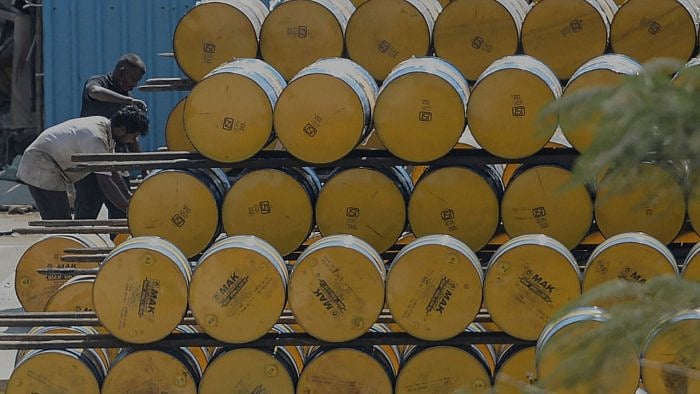
India on Friday hit out at its critics and defended its decision to buy crude oil from Russia, which came under sanctions from the United States and the other western nations after it launched military operations in Ukraine on March 24.
With the Indian Oil Corporation (IOC) already making a move to buy as much as 3 million barrels of crude oil from Russia, New Delhi sought to silence its critics arguing that India’s legitimate energy transactions should not be politicised. Noting that India is highly dependent on imports for meeting its energy requirements, a source in New Delhi said that the nations with oil self-sufficiency or the ones which are still importing oil from Russia could never credibly advocate restrictive trading.
Prime Minister Narendra Modi’s government already conveyed to the US, UK and other western nations that India would go ahead and continue to buy crude oil from Russia. Russia has been a marginal supplier of crude oil to India.
But with Moscow offering crude oil to New Delhi at a discounted price, India has already planned to buy about 12 million barrels of crude oil from Russia at a discounted price over the next few weeks. notwithstanding criticism in the US and the UK.
New Delhi took note of the fact that Russia was exporting oil and gas to various countries across the world, particularly Europe. It noted that 75% of Russia’s total natural gas exports was to the Organisation for Economic Co-operation and Development (OECD), Europe (like Germany, Italy, France). The European countries like the Netherlands, Italy, Poland, Finland, Lithuania, Romania were also large importers of Russian crude oil.
“Notably, recent Western sanctions on Russia have carve-outs to avoid impact on energy imports from Russia. Russian banks that are the main channels for European Union payments for Russian energy imports have not been excluded from SWIFT,” a source in New Delhi pointed out.
Anne-Marie Trevelyan, British Secretary of Trade for International Trade, recently expressed disappointment over India’s decision to avoid criticising Russian President Vladimir Putin for ordering military offensives against Ukraine and its move to buy oil at a cheaper rate from Russia. British Prime Minister Boris Johnson’s spokesperson said that the UK wanted every country to move away from importing oil and gas from Russia, because it directly funded the invasion of Ukraine.
Dr Ami Bera, an Indian-American member of the US Congress, of late criticised India for buying oil from Russia. He also said that if India went ahead to increase its oil import from Russia, it would be choosing to side with Russian President Vladimir Putin despite his regime’s aggression against Ukraine. Not only Bera, but Ro Khanna, another Indian-American member of the US House of Representative, too joined a bipartisan delegation of the American Congress in a meeting with Taranjit Singh Sandhu, New Delhi’s envoy to Washington D.C., and called upon India to directly condemn Russia for its military operations in Ukraine.
President Joe Biden’s Press Secretary Jen Psaki told journalists at White House recently that India buying oil from Russia might not be a violation of the sanctions imposed by the US. She, however, underlined that history would remember where the nations stood on the issue of Russia’s aggression against Ukraine.
Nearly 85% of India crude oil requirement of 5 million barrels a day has to be imported. India mostly imports from West Asia – 23% from Iraq, 18% from Saudi Arabia and 11% from the United Arab Emirates. The US too has now become an important crude oil source for India, amounting to 7.3% of total trade.
The source in New Delhi pointed out that imports from the US were expected to increase substantially in the current year, probably by around 11%.
New Delhi argued that geopolitical developments had posed significant challenges to the energy security of India, which had to stop sourcing from Iran and Venezuela in the wake of the US sanctions on the two nations and alternative sources had often come at a higher cost. "The jump in oil prices in the wake of the Ukraine-Russia conflict now added to our challenges. The pressure for competitive sourcing had naturally increased."
Check out latest videos from DH:

